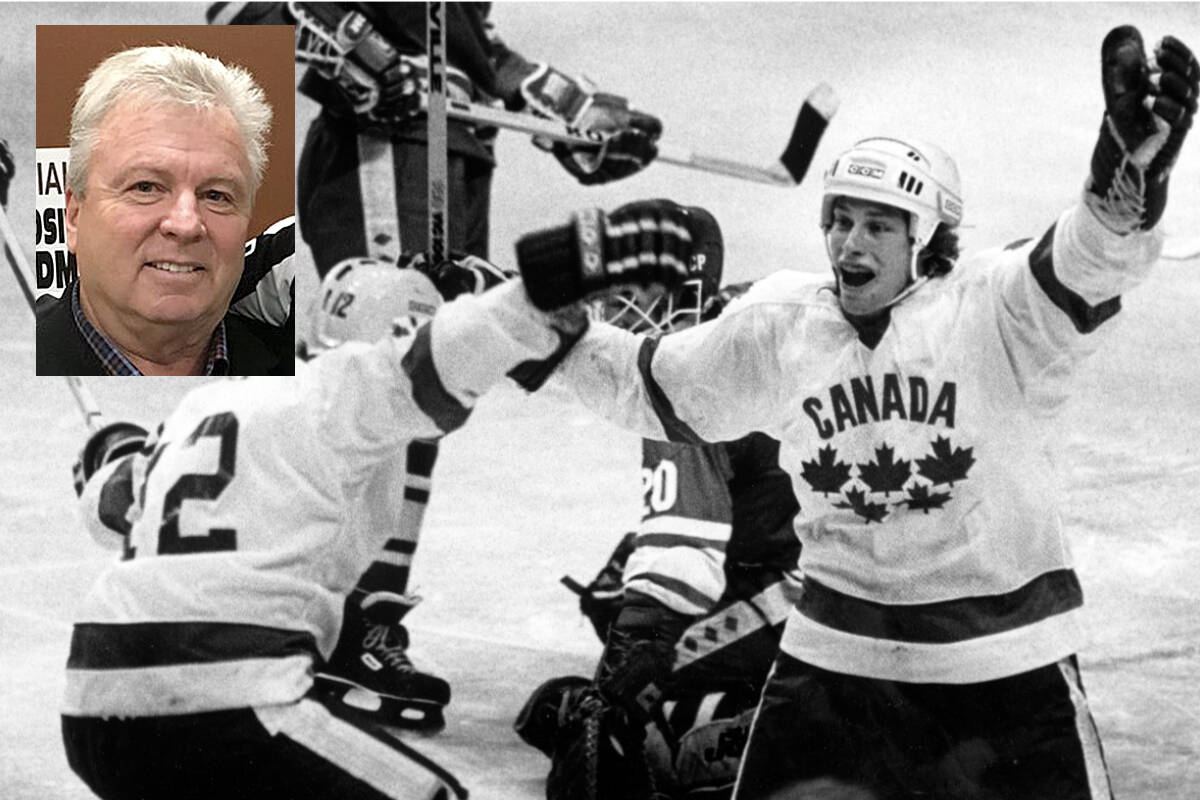Hockey has changed quite a lot since Ronnie Paterson was chosen to join Team Canada for a chance at Olympic gold.
That was in 1980, at Lake Placid, N.Y. – the same year a U.S. team of young college players defeated the powerhouse Soviet Union squad in the semifinals.
Now a proud parent and grandparent, Paterson reflects back on those days with fondness.
“It was a tremendous experience. Any time you’re representing your country is a very proud moment,” he said.
Paterson found out less than two weeks ago that he would be one of this year’s B.C. Hockey Hall of Fame (BCHHF) Class of 2023 inductees, when his longtime friend (and retired Canadian sportscaster well-known for his play-by-play National Hockey League commentary) Jim Hughson gave him a call.
They’d caught up about what each had been up to and chatted about their grandchildren, when Hughson let him know the purpose of the call.
“I’m calling you as good friend and chair of the (BCHHF) board advising you that you’re being inducted into the BCHHF,” Hughson told Paterson.
“It’s very, very humbling. I’m very proud and very reflective, based on what it represents – I know how many special athletes have historically been inducted into the hall and then to learn who else was going in this year was also an extremely proud moment for me.”
READ ALSO: Duncan Keith, Brent Seabrook headline B.C. Hockey Hall of Fame Class of 2023 in Penticton
Back in 1980, Olympic hockey teams were comprised of college and junior (amateur) players, he noted, which meant – as a 23-year-old goaltender for the UBC Thunderbirds – he had the chance to try out for the Olympic team.
He joined the national program under famed Canadian coach Father David Bauer in the late 1970s and trained for a year and a half in Calgary, and ended up being one of three goaltenders who went to Lake Placid.
The White Rock Whalers (Pacific Junior Hockey League) owner and former Surrey Eagles (BC Hockey League) co-owner played plenty of games for Canada in the run-up to the Olympics – at locales all over the globe – but served as the team’s third goaltender at the tournament, which meant he wasn’t in uniform for the games.
He did, however, get to spend some time with the broadcast crew, which included NHL legend Ken Dryden and play-by-play man Al Michaels, the latter of whom voiced the famous line, “Do you believe in miracles?!” when the U.S. won the semifinal game.
The U.S. eventually got the gold medal with a win over Finland in the final.
“It wasn’t optimal – I really wanted to play – but it was still pretty cool,” said Paterson, who was in the building for the famous game, and called it “incredible.”
Canada finished out of the medals, in fifth, at Lake Placid, though Paterson said they certainly had the skill to compete with teams that finished on the podium.
Goaltending was much different in 1980, he recalled.
“I’m 5’6” nowadays you have to be 6’5”,” he pointed out.
“The goaltending was more angles and reactionary and quickness,” Paterson said.
“The position has changed a lot – and, I think, for the better – I really marvel at these goaltenders today at how they stop the puck. It’s been fun to watch the transition. It was certainly a lot different then then it was today… I remember we would practise for the Olympics twice a day and the pads would be soaking wet and heavy afterward.”
Still, he “has nothing but fond memories” of those days and enjoys the “rich experiences and friendships that remain very special.”
PATERSON INTO THE HALL!
Congratulations to our leader Ronnie Paterson for being inducted into the BC Hockey Hall of Fame under the Builders category. Ronnie has made a significant impact and contribution to the game of Hockey.Congrats Ronnie and the rest of the Class of 2023 https://t.co/6Lq5vi5KWJ
— WhiteRockWhalers (@WRWhalersHockey) February 28, 2023
While he briefly entertained the idea of playing professionally in Europe after the Olympics, Paterson returned to UBC and completed his degree in education.
When Molson Breweries – a major sponsor of the national program – offered him a job at their brewery, and he spent 25 years there, working in sales.
Now, he and his family own several successful pubs and liquor stores, which his two sons are involved with.
“They’ve always been involved in the game as well and the family business… I’m very honoured to see them grow and develop it. Hockey and hospitality have been a big part of my life,” he said.
As owner of the White Rock Whalers, now in their fifth year – and up 3-1 in a playoff series against the Richmond Sockeyes (as of Thursday morning, March 2) – Paterson is proud of how the club allows players to continue to play hockey at a competitive level, but also, helps prepare them for life after the arena.
“We try to offer them not only good hockey experiences but good life experiences as well. To be competitive and to win is important, but it’s about finding that balance,” he said.
He’s also involved with a hockey skills camp that happens in Port Alberni for four weeks every summer, so hockey is still an integral part of his life.
He remembers everything his mom, who was a single parent after his father died when he was quite young, did to make it possible for he and his siblings to enjoy the sport.
“I know the sacrifices she made just to allow us as young children to play the game… that wasn’t easy for her,” he said.
“She really gave us a foundation to work from in terms of sacrifice and commitment.”
– with Peace Arch News files
@Canucklehedd
tricia.weel@peacearchnews.com
Like us on Facebook and follow us on Twitter.

